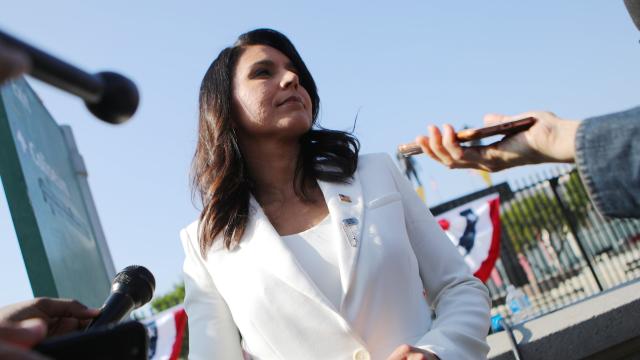A federal judge dismissed outright loooooong-shot Democratic presidential candidate and Hawaii Representative Tulsi Gabbard’s censorship lawsuit decision dated Tuesday that it had nothing resembling a plausible legal basis.
Gabbard’s primary campaign has always been relegated to the political fringe; some of her policy positions seem more aligned with the Trumpian right, while she’s received an eyebrow-raising amount of praise from white nationalists and conspiracy theorists. (On Super Tuesday she received just under 85,000 votes out of over 12,565,000 cast, or around 0.72 per cent, per the New York Times tracker.) A NY Mag profile noted that she “constantly picks low-stakes, politically inopportune fights within her own party,” raising suspicion from critics that her primary motivation is just raising her own national profile.
Gabbard sued Google for $US50 ($76) million in California district court in July 2019, claiming the search giant violated her First Amendment rights as well as state anti-discrimination laws by blocking her campaign from buying ads after the first Democratic debate. (Google says an automated system made a mistake.) That a bunch of provocateurs ranging from professional far-right troll Chuck Johnson, white supremacist Jared Taylor, and the brain trust behind conservative propaganda factory Prager U had already launched similar, unsuccessful lawsuits did little to dissuade the impression this was a PR stunt designed to get her name into headlines.
U.S. District Judge Stephen V. Wilson wasn’t having it. In his opinion, he shot down Gabbard’s argument that Google’s power over the political ad market makes it a “state actor” / public utility exercising traditional government powers, such as running elections and protecting against foreign interference, and thus must respect the First Amendment. Instead, Wilson reiterated what countless prior court decisions have said: the First Amendment actually establishes Google’s constitutional right to run whatever ads it wants.
“Google is not now, nor (to the Court’s knowledge) has it ever been, an arm of the United States government,” Wilson wrote. “… There is no argument that webservices or online political advertising are traditionally exclusive government functions. Plaintiff argues that, by providing some restriction on political advertising on its platform, Google is in effect regulating elections.”
“… Plaintiff fails to establish is how Google’s regulation of its own platform is in any way equivalent to a governmental regulation of an election,” Wilson continued. “Google does not hold primaries, it does not select candidates, and it does not prevent anyone from running for office or voting in elections. To the extent Google “˜regulates’ anything, it regulates its own private speech and platform.”
Wilson then explained that just because Google takes steps to avoid foreign interference on its ads platform during elections, that does not make it a de facto government counter-intelligence agency, and that if he ruled otherwise, that would have implications for any media or tech firm that uses passwords.
“Google protects itself from foreign interference; it does not act as an agent of the United States,” Wilson wrote. “Nearly every media or technology company has some form of cybersecurity procedure. Under Plaintiff’s theory, every media organisation that took steps to prevent foreign cybercrimes could potentially implicate the First Amendment.”
We’d like to imagine that Wilson then wearily pulled a flask out from under his robes and took a long, deep drink.
Google declined to comment to Politico, while Gabbard’s campaign didn’t respond to their request for comment. But hey, maybe that defamation lawsuit she filed against Hillary Clinton will go better. And if that doesn’t work, the third time could be the charm. You just never know until you try again, and again, and again.
